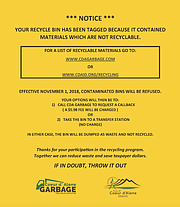If you recycle, beware The Tag
Dirty cans, metal, wood or plastic bags stashed into a blue recycle bin will get you tagged, starting this week.
But the yellow sticker isn’t a fine.
“This is the education end of it,” said Phil Damiano, who operates Coeur d’Alene Garbage and Post Falls Sanitation. “It’s a courtesy to make people aware.”
Beginning this week, Coeur d’Alene’s garbage contractor, which picks up the blue recycle bins weekly in the city’s neighborhoods — to the tune of 24,000 tons a year — will place yellow tags on recycle bins that contain illegal or contaminated items such as food, metal, broken glass or anything else that is not part of the company’s latest recycling protocol.
The effort, a collaboration between the city and the garbage collector, is meant to reduce cost and prevent the recycling program’s collapse.
The yellow tags direct people to the city’s or Coeur d’Alene Garbage’s website, where instructions on what is recyclable, and what is not, can be found.
People have until November to learn what they can dump into the blue bins. After that, if the bins are contaminated they will not be picked up, Damiano said.
The scenario is the result of a crash that turned the international recycling market inside out over the past couple years, resulting in an accrued cost to handle recyclables.
Damiano’s company will continue to accept recyclables, but they have to be clean.
And they have to be on the list of acceptable junk.
Discarded garden hose, broken glass bottles or plates, tires, wire fencing, or greasy pizza boxes are off limits.
So are plastic grocery store bags, batteries and apple cores.
“People put a lot of stuff in there (the blue bins),” council member Dan Gookin said at a City Council meeting in June. “They are passionate about it; they get overzealous.”
Stuff that seems like it could be recycled, but is not on the list, instantly turns an entire truckload into landfill garbage.
Two years ago, Damiano’s company was paid $10 a ton for recyclables. However, a move by China, the world’s largest buyer of recyclables, to limit what it accepts has turned the market on its head.
“It costs us $100 per ton,” Damiano said.
Coeur d’Alene council members last summer opted to absorb the cost to restructure the city’s solid waste contract to reflect market trends. That means the city will pay $17,000 a month for its recycle program.
For the time being residents won’t bear that cost.
“Due to savings experienced with respect to the current contract, the cost will not result in any rate increases to customers,” City Administrator Troy Tymesen said.
Absorbing the monthly cost, though, is temporary.
“This is hoped to be an interim gap-filler … until the market gets it figured out,” Tymesen said.
By listing on its website what is an accepted recyclable and what must go into the green bin, the city hopes to educate residents about the changing market for recyclables.
“We’re trying to build awareness,” Damiano said.



